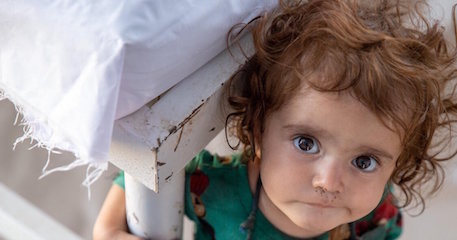UNICEF is working with partners to rush aid to children and families still reeling from the deadly earthquake that shook southeastern Afghanistan on June 22, 2022. Around 362,000 people — including more than 190,000 children — were impacted by the quake, which claimed the lives of at least 155 children and injured nearly 250.
The powerful quake and its aftershocks caused widespread destruction across several districts in Paktika and Khost provinces, leveling houses and destroying health facilities, schools, water systems and other critical infrastructure. July is the hottest month of the year in Afghanistan, with temperatures rarely dropping below 90 degrees. Without access to safe water and adequate sanitation, many children have begun to suffer from diarrhea, a leading cause of death among children under the age of 5.
See inside a UNICEF-supported health facility set up in the ruins of Afghanistan’s June 2022 earthquake:
Stepping carefully through pilies of rubble in Paktika Province’s Gayan District, UNICEF Afghanistan Deputy Representative Allice Akung, above, leads the way to a busy health center where UNICEF is supporting lifesaving health care and nutrition services for children and families affected by the quake. The facility has an acute watery diarrhea ward, an outpatient ward, a laboratory and other essential services.
As of June 28, UNICEF had delivered more than 30 metric tons of medical supplies to earthquake-affected areas in Afghanistan, including 1,000 first aid kits containing supplies to treat 10,000 injured people, 30 kits to treat 10,300 cases of acute watery diarrhea, oral and injectable antibiotics for 30,000 people, 8,500 liters of IV fluids, tents that can house up to 50 patients each, and larger tents that can house up to 170 patients.
© UNICEF/UN0665330/Bidel
Siblings Zaid Allah, 6, Mahbubeh, 9, and Nazi, 4, above from left, are living with their aunt in a tent provided by UNICEF. The children’s mother, father and three older siblings were killed when the earthquake struck Barmal District, Paktika Province.
“It was night and we were all asleep,” Mahbubeh recalls. “Suddenly, I felt the whole place shaking and I was very scared. I woke up and knew it was an earthquake, and I ran away.”
“While I was running away, I called my family loudly to wake up. When I approached the door of the house, I heard my father’s voice saying with fear, ‘What happened to my beloved?’ Suddenly, the whole house collapsed on us.”
Above, 6-year-old Zaid Allah stands in the ruins of his family’s home. The familiy has lived in Barmal for generations.
“I was crying under the rubble and calling for help, and every time I called out to my family, I could not hear a voice,” says Mahbubeh. “The fact that I couldn’t hear a voice from them made me more afraid.”
For now, the children are sheltering with their aunt in the encampment above. Their future remains uncertain. “I don’t know what will happen, and what we will do,” says Mahbubeh. “I am very afraid … And every night, I don’t sleep because of the fear of the earthquake and the last words I heard my father say.”
UNICEF continues to provide medical care and nutrition services through 12 health centers and 9 mobile health and nutrition teams operating in Paktika and Khost provinces. UNICEF is also supporting four Child-Friendly Spaces where children can go to play with other kids and access mental health services and psychosocial support through counselors and case workers.
Your support will help UNICEF reach more children in need in Afghanistan. Please donate today.
Top photo: Mahjahben, 2, is being treated for cholera at a UNICEF-supported mobile health clinic in Gayan District, Paktika Province, Afghanistan. After the June 22, 2022, earthquake, extreme heat and a lack of safe water have led to an increase in cases of waterborne diseases. Photos by Sayed Bidel for UNICEF. Video edited by Tong Su for UNICEF USA.
